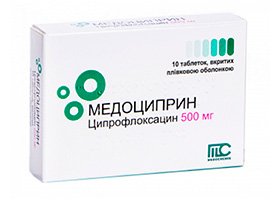
All iLive content is medically reviewed or fact checked to ensure as much factual accuracy as possible.
We have strict sourcing guidelines and only link to reputable media sites, academic research institutions and, whenever possible, medically peer reviewed studies. Note that the numbers in parentheses ([1], [2], etc.) are clickable links to these studies.
If you feel that any of our content is inaccurate, out-of-date, or otherwise questionable, please select it and press Ctrl + Enter.
Medociprine
Medical expert of the article
Last reviewed: 04.07.2025

Medociprin is an antibacterial agent.
ATC classification
Active ingredients
Pharmacological group
Pharmachologic effect
Indications Medociprine
It is used for diseases (affecting the respiratory tract, nasal sinuses, gall bladder, middle ear, eyes, digestive organs and bile ducts) that have an inflammatory-infectious etiology (with or without complications).
It is used for therapy of adnexitis, gonorrhea, endometritis with prostatitis, and also for lesions of bones, soft tissues with epidermis and joints.
It can be prescribed to people with immunodeficiency to prevent or treat infections (also during therapy with immunosuppressants and against the background of neutropenia).
Release form
The component is released in tablet form - volume 0.25 or 0.5 g, 10 pieces per pack.
Pharmacodynamics
Medociprin is a synthetic antimicrobial agent from the fluoroquinolone class of substances. It inhibits the activity of the enzyme DNA gyrase, which is an important component of the process of chromosomal spiralization and despiralization of segments during the stage of microbial reproduction.
The medicine has a rapid bactericidal effect on bacteria, both at rest and in the reproduction stage. It shows activity against almost all gram(+) and gram(-) microbes (including those that produce β-lactamases).
Citrobacter, Serratia, Salmonella with Proteus, Shigella, Providencia and Escherichia coli with Klebsiella have high sensitivity to drugs. In addition to them, there are also Enterobacter, Yersinia, Pasteurella, Hafnia, Morganella, Edwardsiella spp., Campylobacter with Moraxella, Vibrio spp., and also Staphylococcus with Corynebacteria. Together with them, the list includes Aeromonas spp., Legionella, Listeria, Haemophilus, Neisseria with Pseudomonas (including Pseudomonas aeruginosa) and Brucella with Branchamella spp.
Moderate sensitivity is observed in Streptococcus agalactiae, Gardnerella vaginalis, pyogenic streptococci with fecal enterococci, chlamydia and pneumococci, as well as in mycoplasmas, Mycobacterium fortuitum with Acinetobacter, Flavobacterium spp. with Alcaligenes spp. and Koch's bacillus.
Resistance to the drug is usually found in Ureaplasma urealyticum, Treponema pallidum, Streptococcus faecium with Bacteroides fragilis, as well as Clostridium difficile and Nocardia asteroides.
Pharmacokinetics
Once taken, Medociprin is well absorbed, reaching bioavailability values of approximately 70-80%. Plasma Cmax values are recorded after 1-1.5 hours.
Excretion occurs mostly through the kidneys (approximately 45% of the substance is unchanged and approximately 11% is in the form of metabolic products). Another part is excreted by the intestines (approximately 20% of the drug is unchanged and approximately 5-6% is in the form of metabolic products). The half-life is 3-5 hours.
Dosing and administration
Adults are required to consume 0.25-0.75 g of the substance 2 times a day to treat infections affecting the respiratory system (a more precise dosage is selected taking into account the severity of the pathology).
In case of pneumonia caused by streptococci, 0.75 g of the substance should be used twice a day. In case of other infectious lesions, 0.5-0.75 g of the drug should be used per day. The therapeutic cycle lasts at least 5-10 days/maximum 1 month.
For gonorrhea, 0.25 g of Medociprin is used once.
People with kidney problems often do not require dosage adjustments, unless there is significant renal impairment (creatinine clearance values are less than 20 ml/minute). These patients should reduce the daily dose by half.
 [ 12 ]
[ 12 ]
Use Medociprine during pregnancy
Should not be prescribed to women who are breastfeeding or pregnant.
Side effects Medociprine
The medication is often tolerated without complications, although sometimes nausea, itching, diarrhea, headaches or muscle pain may occur, as well as decreased blood pressure, dizziness and pain in the abdominal area.
Occasionally, taste or smell disturbances, jaundice, depression, tinnitus, insomnia, and kidney problems may occur. If the patient experiences these symptoms, medical attention should be sought immediately.
Interactions with other drugs
The combination of the drug with theophylline causes an increase in the blood levels of the latter.
When combining the drug with iron supplements, antacids (containing aluminum, magnesium or calcium) or sucralfate, the absorption of Medociprin decreases. For this reason, it should be taken 1-2 hours before or at least 4 hours after using these drugs.
Individuals using the drug together with cyclosporine should have their blood creatinine levels monitored twice a week.
Combination with anticoagulants may prolong the blood clotting period.
Systemic use of fluoroquinolones with glibenclamide may cause a decrease in blood glucose levels.
 [ 13 ]
[ 13 ]
Storage conditions
Medociprin should be stored in a dark and dry place, out of the reach of small children. Temperature indicators - no higher than 25 ° C.
Shelf life
Medociprin can be used within a 3-year period from the date of release of the pharmaceutical substance.
Manufacturer
Attention!
To simplify the perception of information, this instruction for use of the drug "Medociprine" translated and presented in a special form on the basis of the official instructions for medical use of the drug. Before use read the annotation that came directly to medicines.
Description provided for informational purposes and is not a guide to self-healing. The need for this drug, the purpose of the treatment regimen, methods and dose of the drug is determined solely by the attending physician. Self-medication is dangerous for your health.

